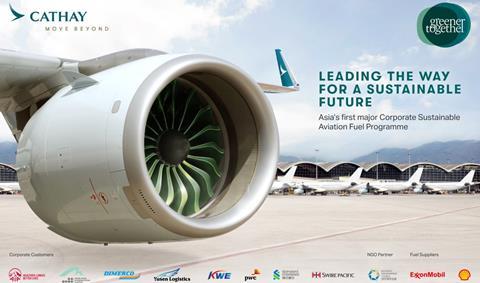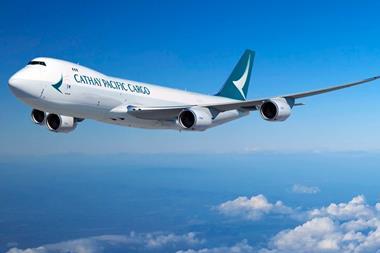
Dimerco Express Group and Yusen Logistics have joined Cathay Pacific's Corporate Sustainable Aviation Fuel (SAF) Programme.
The companies have committed to reducing the climate impact from their airfreight activities through scaling up the use of SAF.
They will also promote the wider adoption of renewable energy by the aviation industry to decarbonise their business travel and cargo shipments.
Non-governmental organisation (NGO) Business Environment Council has also joined the programme.
These new partners join the programme’s launch customers – AIA, Airport Authority Hong Kong (AAHK), Kintetsu World Express (KWE), PwC China, Standard Chartered and Swire Pacific.
Cathay Group chief executive Ronald Lam said: “Cathay is undertaking a multi-pronged approach to contribute to the aviation industry’s transition towards a greener future. SAF is an important facet of this approach, and we have received strong support from our corporate and cargo customers since the launch of our Corporate SAF Programme.
"We have also established new SAF supply partnerships in the broader Asia region to convey a clear message to the SAF supply chain that there is firm demand from this part of the world.
“We would like to warmly welcome our new partners, and express our gratitude to our original launch customers for their continued support of the programme. We look forward to welcoming other interested companies to sign up to reduce their indirect emissions from flight-related activities, and join our mission to be Greener Together.”
Cathay was among the first airlines in the world to announce a target of 10% SAF for its total fuel use by 2030. Since then, it uplifted SAF at Hong Kong International Airport for the first time last year, and successfully conducted its first overseas SAF uplifts on commercial flights at Singapore Changi Airport and Los Angeles International Airport last year.
The SAF Cathay used over the past year was made from used cooking oil and animal fat waste, and was made available by its fuel suppliers, ExxonMobil and Shell.
Last year, Cathay and State Power Investment Corporation (SPIC) signed a Memorandum of Understanding to drive the further development of the SAF supply chain in China.
Cathay aims to achieve its goal of net-zero carbon emissions by 2050.
In addition to increasing the use of SAF, Cathay’s carbon reduction roadmap includes fleet modernisation, operational efficiency improvements, leveraging on emerging technology breakthroughs to decarbonise aviation, and carbon offset projects.














